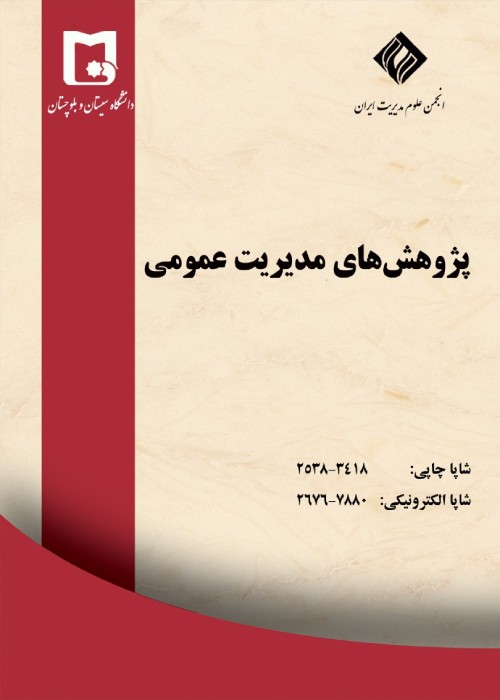Investigating the Mediating Role of Ethical Climate in the Effect of Authentic leadership and Hyprosity Management on Anti-Organizational Citizenship Behaviour
Studies show that anti-citizenship behaviors can cause many problems in the organization. However, anti-citizenship behaviors and the impact of leadership style on them have been less studied. Accordingly, the effect that both styles of authenticity and hypocrisy can have on anti-citizenship behavior through the ethical climate of the organization has been investigated in the present study. The population of the study consisted of 285 administrative staff, among which 151 were selected by stratified sampling method. Tools used to collected data authentic leadership questionnaire of Avolio et.al(2006), researcher-made hypocritical management questionnaire based on the hypocritical behavior components of Crisp and Cotton (1994), ethical climate questionnaire developed by Victor and Cullen(1988) and anti- organizational citizenship behavior questionnaire of Gholipour et.al(2008) that content validity structures and reliability of their approval reached. The results of the research indicated that leadership styles of authenticity and hypocrisy through ethical climate significantly affect organizational anti-citizenship behaviors. But the significant direct effect of these two styles on anti-citizenship behaviors was not confirme.
Most studies suggest that a key characteristic of organizational leadership is "integrity". Eisenhower went even further and claiming that it is not only a key characteristic, but also the most important characteristic of leadership, and without it, leadership success would not be possible in any field, including the football field, the army, or at the organizations (Covey, 2005). Also, the results of a survey show the more than 70% leaders of top companies of S&P index have believed that honesty is one of their core values (Guiso, Sapienza & Zingales, 2015). Hence, Avolio & Gardner (2005) have emphasized "integrity" as one of the principle values of leadership in the development of authentic leadership. This type of leadership become reality in the allingment between words and deeds, the allingement between words and values, and the stability of behavior in various situations, which is referred to as behavioral courage(Simons, Leroy, Collewaert & Masschelein, 2015). Peterson & Seligman suggesteded integrity as one of the dimensions of moral courage and it equivalented as "authenticity". According to them, being authentic means integrity in words, integrity in appearance, integrity in behavior and integrity in responsibility (Rego, Cunha & Clegg 2014). On the other hand, deceitful and hypocritical behavior is opposite to leaders integrity behaviors (Shareef Younus, Ahmmad, & Radrakrishnan, 2019). A hypocritical manager is one whose behavior and actions aren't alignment with the beliefs he or she has expressed (Zamulinski, 2015). Baston et al.(1997) defined it as pretend of morality without payment(Jauernig, 2019). The ethical behavior of organizational leaders is important because they are the creators of the organization's social behaviors. If employees feel that the managers of the organization are integrity in their social exchange, they will also tend to positive behaviors, and vice versa, if they witness the hypocritical behavior of their managers, they will behave accordingly. Meanwhile, they are able to direct employee behavior by shaping the ethical environment of the organization (Cheng & Wang, 2015). Hence, the present study search to explain the mediating role of the ethical climate as a result of authenticity and hypocritical leadership on organizational anti-citizenship behavior.
Case study
The statistical population of the study included 285 employees of the headquarters of education adminstration of south khorasan province and its affiliated units in 11 cities of the province. According to Morgan table, 163 people were selected as the sample size and selected using stratified random sampling method. Among the distributed questionnaires, 151 items were returned and used for statistical analysis.
This study is an applied research in terms of its objective, is descriptive in nature, and is of survey type in terms of its data collection and method. the required information was collected using questionnaires. To test the research hypotheses, structural equation modeling has been used.
The results of hypothesis testing showed that of between 8 proposed hypotheses, 6 hypotheses have been confirmed and 2 other hypotheses not approved. As a result of this test, was not confirmed the direct and significant effect of authentic leadership and hypocritical management on anti-citizenship behaviors. But, was confirmed the effect of authentic leadership style and hypocritical management on the ethical climate as a mediating variable and the effect of this variable on anti-citizenship behaviors. In this regard, was confirmed the mediating role of the ethical climate. Authentic leadership have a positive effect on ethical climate; hence, decrease anti-citizenship behaviors. Vice versa, hypocritical management increased anti-citizenship behaviors; because, it have a negative effect on ethical climate.
Aim of present research was to examine the role of authentic and hypocritical leadership styles on anti-citizenship behavior through the ethical climate of the organization. Anti-citizenship behaviors can very impact on organizations. Hence, hypotheses (1) and (2) predicted that authentic and hypocritical leadership styles would directly direct anti-citizen behavior. But the findings of the study, did not confirm this prediction contrary to the results of studies by Choi et al. (2020), Peng and Wei (2019) and Pierce and Gikalon (2003), because the behavior of people derive from their perception of organizational variables such as ethical climate. Nevertheless, the results of hypotheses (3) and (4) were similare to research findings of Quincy et al. (2019) and Simmons et al. (2015) showed that authentic and hypocritical leadership can affect the ethical climate of a organization. Because, the manager's leadership style plays an important role in the set of employees' cognitive interpretations of the organization, including the ethical climate. On the other hand, like the findings of Newman et al. (2017) and Zeinali Soomeh and Pourezat (2012), hypotheses (5) and (6) confirmed the significant effect of ethical climate influenced by management style on anti-citizen behavior. As mentioned, the ethical climate refers to behaviors that are thought to be morally correct and indicate response against how to deviate from those behaviors (Shacklocki, Manning, Hort, 2011). But, the examination and confirmation of the mediating role of the ethical climate as a result of impact authentic leadership and hypocritical management on anti-citizenship behaviors within the framework of Hypotheses (7) and (8) was distinctive charactristic of present study compared with previous research. According to Litvin and Escheringer (1968), organizational climate is a filter through which the expectations of leaders and the characteristics of the organization are understood and create appropriate behaviors in the organization. Therefore, is suggested to managers that be adopting ethical styles such as authentic leadership and avoiding hypocrisy in order to reduce the scope and severity of destructive behaviors such as their employees anti-citizenship behaviors.
- حق عضویت دریافتی صرف حمایت از نشریات عضو و نگهداری، تکمیل و توسعه مگیران میشود.
- پرداخت حق اشتراک و دانلود مقالات اجازه بازنشر آن در سایر رسانههای چاپی و دیجیتال را به کاربر نمیدهد.



